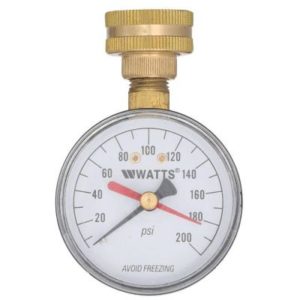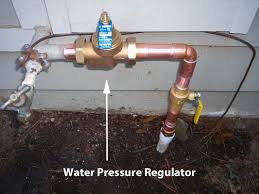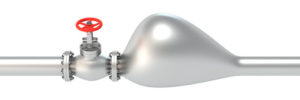Water pressure is measured in pounds per square inch (PSI), and normal water pressure is typically between 30 and 80 PSI. Functional flow is the volume of water flowing through your pipes and arriving at individual fixtures. Poor functional flow may be due to buildups in the pipes or poor plumbing.
5 Tips for Increasing Water Pressure
Ever taken a bath or tried to fill up the sink to wash dishes with low water pressure? It’s the worst. It takes forever and you know it doesn’t have to be that way. What can you do? Here are 5 tips to increase water pressure. If these don’t work, well…it might be time to call in a professional Plumber or consult Bayview Water and Sewer.
Check the water meter. – Yes, you would assume it’s all the way on, but things happen. Be sure it’s operating at full strength capacity.
Check your main shut off valve at the street. – It’s not unusual to have work done and then slowly let water back into the pipes to ensure everything is okay. Sometimes it gets left in that position. Make sure it’s full on.
Check the pressure regulator. – Each home has a pressure regulator on its pipes to ensure water isn’t rushing into your home too quickly. If too much pressure is built up it can harm or blow our fixtures and faucets and possibly pipes. Pressure regulators make sure the 100 PSI received from the water tower is reduced to between 80PSI and 50PSI before entering your home.
Check your faucets. – If you’re experiencing low or high water pressure, go outside and turn on the outside spigot. If that faucet is experiencing the same flow, then look to the previous 3 steps. However, if the outside pressure is fine, you might need to replace washers or fixtures at the point of the variation in pressure. If you don’t know how, call a Plumber.
Could it be your pipes? – If you have sediment or dirt in your lines or buildup from many, many years of galvanized pipes, it may be time to re-pipe your home. This is not cheap, but can make all the difference in water pressure and comfort. A certified or master plumber can give you an estimate and take care of the project for you.
Our responsibility here at Bayview Water and Sewer is form the storage tank to the meter in front of your home. You are responsible is from the meter, to your house.
HOW TO TEST YOU HOME WATER PRESSURE
To test water pressure you will need a pressure gauge that measures in psi (pounds per square inch).
You can purchase a pressure gauge for around $10 at a local hardware or home improvement store. To make it really easy get one with female hose threads so you will be able to screw this onto a hose bib or washing machine bib.
Remove the hose from any outside hose bib and screw the pressure gauge onto the fixture. There should be a rubber hose gasket inside the pressure gauge which will make it seal easily. You should be able to simply hand tighten the pressure gauge and get a good seal. If it leaks a little then you will have to tighten it a bit more with pliers because a good seal is necessary to accurately read the psi.
Turn the hose bib on to get a reading of the water pressure. Most common pressure regulators have a maximum adjustment up to 75 psi, so if the reading on the pressure gauge is over 75 psi then you know that the pressure regulator is not working correctly and will have to be repaired or replaced. If you currently don’t have a pressure regulator installed and the water pressure reading is this high a regulator should be installed.
An alternate place to check your water pressure at your house is your washing machine bib. You will have to shut off one of the two valves behind the washing machine and disconnect the washing machine hose. Then simply screw on the pressure gauge and turn the valve on to get a reading.
If you find your water pressure is to high you might need to adjust, replace or install a new pressure regulator.
HIGH WATER PRESSURE
It is important to learn how to detect and prevent it. Feeling warm water pelleting your body in a shower is one of the benefits of water pressure that is adequately high. However, water pressure that is too high can cause expensive and annoying damage.
The water that comes into a home from the main water systems is often flowing at a pressure that is higher than necessary for household appliances. In time, the pressure can cause damage to pipes, walls and possessions.
The supplier can also change the external pressure without warning the homeowner. Have a routine water pressure check can give peace of mind that there is not a hidden problem from pressure. Your plumber can also help you with low water pressure.
High water pressure is major cause of leaks, pipe damage, and wasted water. It is important to learn how to detect and prevent it. Feeling warm water pelleting your body in a shower is one of the benefits of water pressure that is adequately high. However, water pressure that is too high can cause expensive and annoying damage. Idaho has licensed plumbers who will check your water pressure and provide a reasonable, written estimate if any repairs are needed.
You may have a problem with water pressure if you notice leaks in more than one fixture in your home. You may also notice odd leaks or the sound of leaking water once in a while, perhaps at night when it is quiet. When your toilets run occasionally when they are not being used can also be a sign of high water pressure and should be checked by a plumber.
Most manufacturers recommend that water pressure be no more than 80psi (pounds per square inch). Water pressure coming into the house may be much greater than this maximum either due to the height of the supplying water storage tank or commercial uses in the area that may require higher psi. Anything higher 80 psi can cause fixtures such as water heaters, faucets, shut-off valves and toilet parts to fail prematurely.
People usually don’t realize they have high water pressure, but unwanted stress is being applied to the entire home’s plumbing system. It may go undetected until the problems are compounded and pipes break, water heaters break or toilets fail.
Most homes built after 2002 have a PVR pressure regulatory valve. The lifespan of the valves is from 7 to 12 years. Older homes have often had a valve installed. However, the pressure should be checked to make sure they are doing their job. The valve is usually located near the shut off valve.
If you notice any of the following you should call your plumber as soon as possible as they are indicators of high water pressure.
Banging pipes.
Water spitting out of your faucets when you turn them on.
Water heater going out.
Leaking faucets.
running toilets
The failure of appliances that use water
A high water pressure issue can cause damage to your plumbing and appliances, as well as, increased water bills.
Hope this helps
Bayview Water and Sewer


